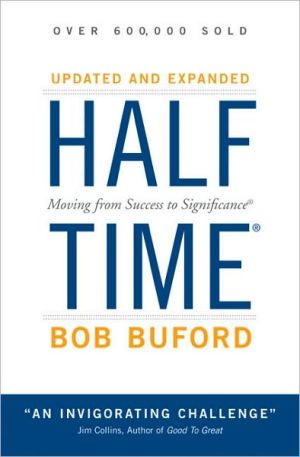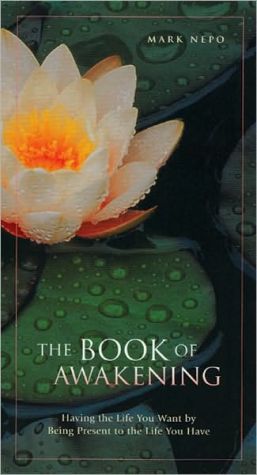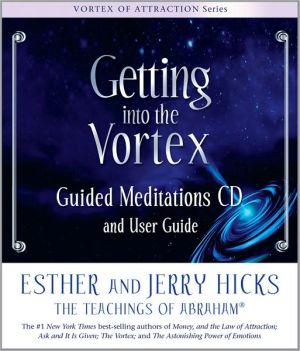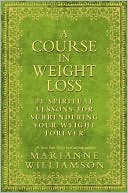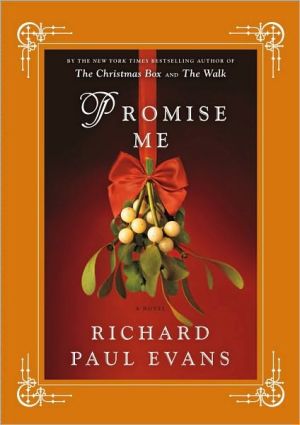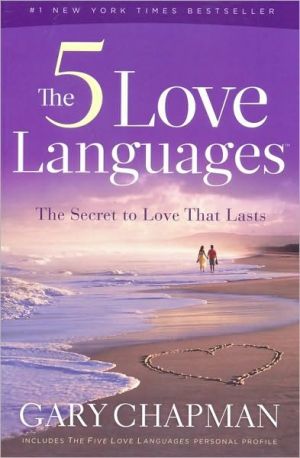Halftime: Moving from Success to Significance
Are you ready to move into the second half of your life?\ Bob Buford believes the second half of your life can be better than the first. Much better. But first, you need time to figure out what you want to do with the rest of your life.\ In Halftime, Buford focuses on this important time of transition—the time when, as he says, a person moves beyond the first half of the game of life. It's halftime, a time of revitalization and for catching a new vision for living the second half, the half...
Search in google:
Halftime. Time to pause, midway in the game of your life, and consider how to make the transition from professional success to significance. Revised and expanded for a new generation of leaders, Bob Buford's bestseller shows how you can make the second half of your life even more rewarding than the first.
\ Halftime\ \ Changing your game plan from success to significance \ \ \ \ By Bob Buford \ Zondervan \ Copyright © 2008 \ \ The Leadership Network, Inc.\ All right reserved.\ \ \ ISBN: 978-0-310-28424-6 \ \ \ \ \ Chapter One Listening to the Gentle Whisper \ Then a great and powerful wind tore the mountains apart and shattered the rocks before the Lord, but the Lord was not in the wind. After the wind there was an earthquake, but the Lord was not in the earthquake. After the earthquake came a fire, but the Lord was not in the fire. And after the fire came a gentle whisper. 1 Kings 19:11-12\ I have not always paid attention to my life. To be honest, I only began paying close attention when I reached my early forties and found myself in a success panic. I was the president and CEO of a tremendously successful cable television company. I was fully engaged in a good and growing marriage. We had a son who was - there's no more appropriate way to say it - a prize.\ And, of course, there was something gnawing at me. How was it that I could be so successful, so fortunate, and yet so frustratingly unfulfilled?\ I knew perfectly well what I believed about business strategies and practices, family relationships, and the importance of friends. But I had not decided how I was going to reconcile all of these competing interests. And, as for the most important issue of all, my faith life, I knew what I believed, but I didn't really know what I planned to do about what I believed.\ It was then that I started to wrestle with what I wanted out of the second half of my life. I was gripped with an unformed but very compelling idea that I should make my life truly productive, not merely profitable. Making a lot of money has its benefits, but what was I leaving behind that would make a difference in the world? Something was telling me that there was more to life than money. I began to reckon with the implications of the seasons of my life and to listen for the sound of the gentle stillness that breaks forth, unexpectedly, after the fire.\ I began asking myself questions like these:\ Am I listening for the still, small voice? Is my work still the center of my life and identity? Do I have an eternal perspective as a prism through which I view my life? What is my truest purpose? My life work? My destiny? What does it really mean to "have it all"? What do I want to be remembered for? What would my life look like if it really turned out well?\ In the Scriptures, Jesus Christ taught that he had come to earth so that his followers might have abundant life, life to the fullest. That's a wonderful sentiment. And I think its point is missed by many people who think that religion is restrictive and forbidding, who think that Jesus came to scowl and scold and say, "No!" The Jesus I had come to know and love was leading me to the paths of a large life, not a small or narrow one. He was asking me to say a loud "Yes!" to a life packed with significance.\ But I did not hear his yes in my first half because I was too busy to listen.\ The issue for me was not belief. I was given the gift of belief in God at an early age. But for most of my first half, I was, to use a sports metaphor, stranded on second base. Consider the diagram on the next page, the concept of which first came to me from pastor and author Rick Warren.\ First base is taking the simple, childlike step of belief, which is all that is required to become a member of God's family. For me it was a simple acceptance that what Jesus said about himself in the Bible was true. This step involves what Kierkegaard called "a leap of faith." Faith doesn't deny reason, but it is different than reason. It accepts, as a gift from God, a different set of capacities. Without faith we are spectators to affairs of the heart and soul. With faith we can go on to engage the other two capacities, our rational and emotional senses, on the journey of personal growth to second base.\ For me the journey to second base was entirely about belief. It first engaged the heart and then the head. Rounding second base involved a shift from being what the Bible calls a "hearer of the Word" to being a "doer of the Word" - a shift from viewing faith as an internally held belief system to faith expressed in the form of loving behavior.\ Like the majority of people who attend church and express a belief in God, I was comfortable standing on second base, making sure I believed the right things. I went to church on Sunday, listened to a sermon to strengthen my beliefs, and any "doing" was pretty much limited to putting some money in the offering plate and volunteering to teach a Sunday school class.\ There is nothing wrong with belief. It's really the only thing God requires of us to receive his gift of eternal life. But God desires so much more for us than just right thinking. Faith expressed in behavior is "the most excellent way." Paul speaks of this in his great chapter on love, 1 Corinthians 13, which ends, "Now these three remain: faith, hope and love. But the greatest of these is love." The Greek word for love, agape, is exactly the same as the word for charity. Charity is the expression of love. It is as if faith and hope were acquired on the journey to second base in order to equip us for the second-half journey toward home base.\ Third base involves becoming a follower by expressing our faith in the form of concrete action, usually in a religious setting, either a church or a parachurch organization. And then we are finally on the last stretch, the journey to home base. This stage involves making ourselves what Gordon MacDonald has called "kingdom builders." This means finding the mission in the world that has been specifically designed by God for each of us to do. It is what the Greeks called "destiny," what poet John Donne referred to when he said, "No man is an island, entire of itself."\ The second half of the baseball diamond is about good works. It is not at all separate from the first half, which is about belief, but grows out of that belief and gives it integrity. Paraphrasing James's famous line, "Faith without works is dead," I would put it this way: "Faith without works dies." The life of faith must become a life of individual responsibility. The legs and hands must follow the heart and the head, or the body is not whole.\ While God would like to see all of us hit a home run, most Christians never get beyond belief. A 2007 Gallup poll reported that 82 percent of Americans declare themselves to be Christians, which ought to be enough to infuse solid biblical values into all areas of culture. I do not doubt Gallup's findings, but I must tell you I do not see nearly that much evidence of Christian faith in our society. I believe that is because most of us are stuck somewhere between first and second base.\ In the first half of life, there is barely enough time to go beyond second base. We are hunter-gatherers, doing our best to provide for our families, to advance our careers, and to pass our beliefs and values on to our children. In addition, for most men, and certainly a growing number of women, the first half finds us in our warrior mode. We need to prove to ourselves and others that we can accomplish something big, and the best way to do that is to become increasingly focused and intense.\ I think of the first half as a season in which to develop faith and learn more about the unique way the Bible approaches life. The second half, when the pressure lets up, seems to be more the time when most people round second base and begin to do something about the faith they have developed. That's how it was for me.\ In The Odyssey, the epic telling of the life of Odysseus, two great forces are pulling at Odysseus: work and home. He yearns to get home, yet he enjoys the battles along the way. Do you feel a kinship to him? During the first half, we too are pulled between the desire to be with our families and the adventure of trying to make it in our careers. Is it any wonder we do not hear that still, small voice calling us to something better?\ The first half of life has to do with achieving and gaining, learning and earning. The majority do this in the most ordinary of ways: getting an education, entering the workforce, starting a family, buying a house, earning enough money to provide for needs as well as a few wants, setting goals, and climbing toward them. Some chase the prize in a more spectacular, aggressive fashion: closing a major deal, winning the big case, acquiring through leveraged buyouts and mergers, doing whatever it takes to make it to the top. Either way, few leave time in the first half for listening to God. If we have any spiritual interests, they usually take their form in typical first-half fashion: serving on the church building committee, teaching a Sunday school class, or organizing the annual stewardship campaign.\ The second half is riskier because it has to do with living beyond the immediate. It is about releasing the seed of creativity and energy that has been implanted within us, watering and cultivating it so that we may be abundantly fruitful. It involves investing our gifts in ser vice to others - and receiving the personal joy that comes as a result of that spending. This is the kind of risk for which entrepreneurs earn excellent returns much of the time.\ True entrepreneurship is not foolhardy; nor does it require particular courage. It merely seeks to gather and examine as many of the facts as possible about the market and the environment that might impact a decision. And then a decision must quickly be made. Likewise, for the second half of life to be better than the first, you must make the choice to step outside of the safety of living on autopilot. You must wrestle with who you are, why you believe what you profess to believe about your life, and what you do to provide meaning and structure to your daily activities and relationships.\ There is a risk in this decision: in tossing aside the security blanket that keeps you safe and warm in your cautiously controlled zone of comfort, you may have to set aside familiar markers and reference points. You may feel, at least at first, that you are losing control of your life.\ To that I say, "Good for you."\ It really is good for you to surrender control and, in the process, come more fully to your senses - those senses that enable you to be aware of life's adventures and rewards.\ Your future, particularly in turbulent times such as these, is in great measure beyond your control, no matter how hard you try to nail it down or plan it out. This is true whatever season of life you find yourself passing through. Yet perhaps it is most resonant for those who are approaching their middle years, as I did when I was in my forties.\ For me the transition into the afternoon of life was a time for reordering my time and my treasure, for reconfiguring my values and my vision of what life could be. It represented more than a renewal; it was a new beginning. It was more than a reality check; it was a fresh and leisurely look into the holiest chamber of my own heart, affording me, at last, an opportunity to respond to my soul's deepest longings.\ And it was, as it turned out, a time to plant and a time to uproot, a time to weep and a time to laugh, a time to mourn and a time to dance, a time to search and a time to give up, a time to keep and a time to throw away. It has been the most important time in my life.\ So far.\ Writer and director Norman Corwin, now in his nineties, recalled his transition into middle age in the book The Ageless Spirit: "I remember now that the toughest birthday I ever faced was my fortieth. It was a big symbol because it said good-bye, good-bye, and good-bye to youth. But I think that when one has passed through that age it's like breaking the sound barrier."\ For it surely is a time to discover, as George Bernard Shaw had some years before, a taste of the "true joy" of life. He described it this way:\ This is the true joy in life - the being used for a purpose recognized by yourself as a mighty one, the being a force of nature instead of a feverish, selfish little clod of ailments and grievances, complaining that the world will not devote itself to making you happy. I am of the opinion that my life belongs to the whole community, and as long as I live, it is my privilege to do for it whatever I can. I want to be thoroughly used up when I die, for the harder I work, the more I live. I rejoice in life for its own sake. Life is no brief candle to me. It is a sort of splendid torch which I've got ahold of for the moment, and I want to make it burn as brightly as possible before handing it on to future generations.\ In the introduction, I asked you to write your own epitaph to help you begin to think about your second half. Here's a question that will help you with the same goal: If your life were absolutely perfect, how would it look to you?\ That's something worth mulling over for a good while, because the picture that will emerge is a snapshot that will help you find your bliss, your blessedness. But it will be an accurate picture only to the extent that you listen to the still, small voice within.\ (Continues...)\ \ \ \ \ \ Excerpted from Halftime by Bob Buford Copyright © 2008 by The Leadership Network, Inc.. Excerpted by permission.\ All rights reserved. No part of this excerpt may be reproduced or reprinted without permission in writing from the publisher.\ Excerpts are provided by Dial-A-Book Inc. solely for the personal use of visitors to this web site.\ \
Contents Foreword Introduction: Opening the Heart's Holiest Chamber Part 1 The First Half 1. Listening to the Gentle Whisper 2. The Hour of Reverse Conversion 3. A Season of Searching and Self-Help 4. Success Panic 5. Locating the Mainspring 6. 'Adios, Ross' Part 2 Halftime 7. Taking Stock 8. What Do You Believe? 9. Finding Your One Thing 10. From Success to Significance 11. Finding the Center and Staying There 12. Staying in the Game, But Adjusting the Plan 13. Overlapping Curves 14. Leaping into the Abyss Part 3 The Second Half 15. Life Mission 16. Regaining Control 17. Healthy Individualism 18. Life-long Learning 19. Respect for Externals 20. Playing for All You're Worth 21. A 50/50 Proposition Acknowledgments Selected Bibliography Discussion Guide
